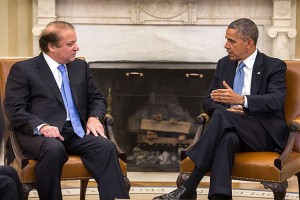
Nawaz Sharif and Barack Obama 2013. By Office of the Press Secretary, US Federal Government via Wikimedia Commons
Here in the United States, the news that has been front and center in the press and on television tends to be the flashy and/or graphic, such as the Ferguson protests, the Ebola outbreak and the Islamic State’s atrocities in Iraq and Syria; stories that are meant to grab the public’s attention. While all of these are important stories (and ones that we’ve discussed ourselves), there’s a lot of news that doesn’t get the coverage it deserves. One of those news items is what’s been happening in Pakistan as of late.
In June 2013, Nawaz Sharif was elected Prime Minister of Pakistan, in what was hailed at the time as the first peaceful transition from one democratically elected government to another. This is actually Sharif’s third term as Prime Minister; he served two terms in the 1990s before being ousted in a coup (the usual transition method between governments in Pakistan). After being released from jail following the coup, he was exiled to Saudi Arabia, and returned to Pakistan in 2007.
However, the optimism following Sharif’s election has soured. First, he won some enemies in the military by bringing high treason charges against Pervez Musharraf, the general who unseated him during the coup and went on to rule Pakistan first as head of state from 1999 to 2001, and then as President from 2001 to 2008. Raza Rumi, a prominent Pakistani journalist and senior fellow at the Jinnah Institute, says; “As Sharif attempts to hold a general accountable, there is a backlash not just from the army but also the political segments that think of the military as the savior.”
Then, there’s the civilian opposition. Led by Imran Khan, a famous and charismatic cricket player who became a politician, and Tahir-ul-Qadri, a firebrand Canada-based cleric, the opposition is calling on Sharif to resign, citing corruption and election rigging as the grounds for the resignation.
On Tuesday, thousands of anti-government protesters occupied the Red Zone; a heavily fortified area that includes the parliament, government offices and diplomatic missions. Wednesday morning, protesters armed with sticks started guarding the entrances to many government buildings, saying that the buildings were under the control of demonstrators and that no one was allowed to enter or leave.
On Wednesday night, the two sides were engaged in discussions, but yesterday Khan pulled out of the talks, Khan’s party said it had presented six demands – which included the resignation of Sharif – for continuing the discussions with the government. On the other side, the Pakistani parliament called Khan’s demands unconstitutional.
The military is urging a negotiated settlement between Sharif’s government and the opposition. However, we can’t rule out the possibility of the military becoming more active, especially if Sharif starts taking a hard line with the protesters.
Ahmed Humayun, a South Asia fellow at the Atlantic Council, suggests one situation where the military would possibly act: “This will especially be the case if Sharif overreacts and law enforcement authorities exhibit excessive force against demonstrators, creating political fodder for Sharif’s opponents. In such an instance, the army may put pressure on Sharif to hold elections early — either later in 2014 or early in 2015. However, if Sharif does not oblige, then direct military intervention followed by the installation of a caretaker government is not out of the question.”
The U.S.’s relationship with Pakistan’s been up and down over the years. Once cultivated to be one of our best allies in the region due to its proximity to China, we used Pakistan (to be exact, the ISI – Pakistani military intelligence) to funnel money to the mujahideen during the Soviet occupation of Afghanistan. On the other side of the coin, we’ve launched numerous drone strikes on targets in Pakistan, as well as the raid that killed bin Laden; not exactly the way you’d treat an ally.
Why is this important? A stable Pakistan is in the world’s best interests. Pakistan’s the only Islamic state with nuclear weapons for starters. Then, there’s the newly elected nationalist government in India. India and Pakistan have had issues between them since before Pakistan became an independent country; it was once part of India. And, India has nuclear weapons itself.
We hope that the situation resolves itself peacefully, and without intervention by the military. A democracy’s childhood/adolescence is often hard, with many challenges to be overcome. We believe in the people of Pakistan’s desire and ability to do exactly that.


Regarding “News you might have missed”, and all you daily postings. I am a creature of habit, so change happens slowly, however it is happening. Your site is becoming a source I go to for news/analysis that is not available elsewhere. Thanks for all the good work you are doing.
Neil Fagerhaugh
Hugo, MN